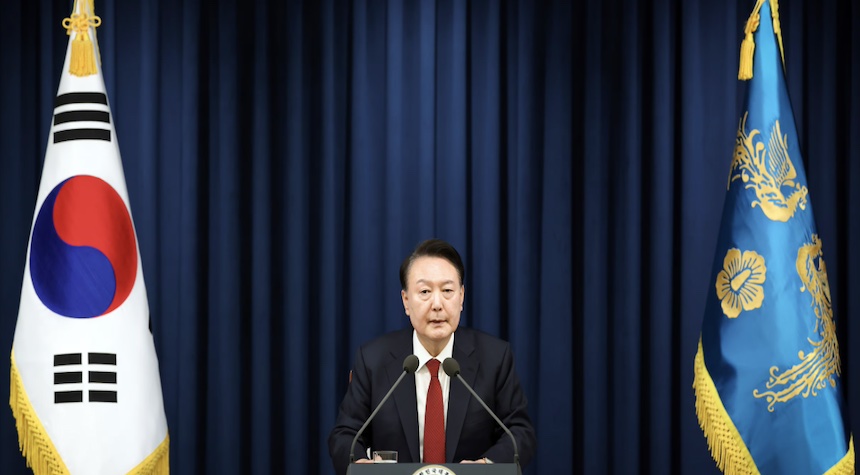The South Korean Constitutional Court removed Yoon Suk Yeol unanimously from office on Friday. This ended his turbulent presidency and set up a fresh election four months after the ill-fated martial law declaration that he had made.
The verdict marked the end of a dramatic decline for Yoon, an ex-star prosecutor who was elected president in 2022 just one year after entering politics.
Moon Hyung Bae, acting chief of the court, said that the eight-member bench had found Yoon’s action unconstitutional.
Moon stated that the defendant had “brought back the history” of abuse of state emergency decrees by declaring martial laws in violation of the Constitution and other laws. This action shocked the public and caused confusion and chaos in society, the economy, and politics.
The justice concluded, “Given the negative impact of the defendant’s violation on constitutional order and its grave ripple effects, we find the benefits of upholding constitution by dismissing defendant outweigh the losses to the nation from the dismissal the president.”
When the verdict was read in the early morning, anti-Yoon demonstrators near the court burst into tears and began to dance. Two women wept while hugging, and an older man nearby jumped to his feet with joy and shouted. Later, the crowd marched through Seoul’s streets.
Many supporters outside Yoon’s residence screamed and yelled when they saw the news of the ruling on a large TV screen. They quickly calmed down when their organizer asked for peace.
“We won’t be shaken!” A protest leader shouted from the stage. “Anyone who accepts the ruling and prepares an early presidential elections is our enemy.”
By late afternoon, there had been no major incidents of violence reported.

In two months, a new presidential election will take place. A lingering division over Yoon’s impeachment may complicate South Korea’s efforts to address important issues such as President Donald Trump’s tariffs and “America First” policies.
In a statement released by his defense team, Yoon expressed regret for not living up to public expectations but did not accept the verdict. It was feared that he might incite resistance to his removal as he had earlier promised to fight until the end.
He said that he would pray for the nation and its people. Yoon stated that serving our nation was the biggest honor of his life.
Yoon’s People Power Party, which is in power, said that it would accept the ruling. However, Yoon Kap Keun, one of Yoon’s lawyers, described the ruling as “completely uncomprehensible” – and a pure political decision.
Han Duck-soo vowed that he would maintain public order and safety and make sure the transition to the new administration was smooth.
Lee Jae Myung, the leader of the Democratic Party (the main liberal opposition party), is considered the favorite for the upcoming by-election presidential race, despite the fact that he has been charged with corruption and several other crimes.
Lee praised the South Koreans for “protecting [our] democratic republic” and welcomed the ruling.
The martial law only lasted six hours, but it left behind a political crisis that rattled financial markets and upset the country’s diplomatic partners.
Yoon announced martial law in the late hours of Dec. 3 and sent hundreds to the National Assembly as well as election offices, among other places. Special operations soldiers broke windows in the National Assembly and fought with protesters. This brought back painful memories for many South Koreans of military rule during the past.
The assembly was able to reject Yoon’s order unanimously, with some members of the ruling party.
Yoon instructed senior officers of the military and police to be present at the assembly to prevent the vote on the decree or the detention of political opponents. Yoon claims the troops were sent to the assembly to keep order.
The National Assembly impeached Yoon, a conservative 64-year-old, on December 14. The National Assembly accused Yoon of violating laws and the constitution by attempting to arrest politicians and suppressing assemblies.
Yoon, in his final testimony before the Constitutional Court, said that his decree was an attempt to gain public support for his fight against “wickedness,” which he claimed had been displayed by the Democratic Party. The party, he said, had blocked his agenda, impeached officials, and cut the budget of the government. He had earlier called the National Assembly a “den of criminals” as well as an “anti-state force.”
The Constitutional Court found that Yoon violated the Assembly’s rights to demand martial laws be lifted, freedom of political parties, and neutrality of military. The court also stated that Yoon’s impasse with the opposition was not an emergency situation that would require martial law and that Yoon’s decree did not follow required legal procedures like deliberation in a formal cabinet meeting.
Yoon was indicted for rebellion concerning his decree. If convicted, the charge carries a death sentence or life imprisonment. He was the first South Korean President to be arrested while in office.
Yoon was freed from prison in March, after the Seoul District Court ruled that he didn’t have to be held during this trial.
Yoon’s removal from office will also cost him the immunity of the president, which protected him from criminal prosecutions. Some observers believe that he may face criminal charges such as abuses of power concerning his martial law order.

